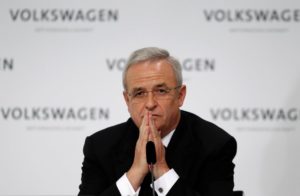Does the criminal prosecution of a corporation affect the CEO?
Or do criminal actions directed at the organization itself pose few consequences for the individuals at the top, and the CEO in particular?
While CEOs are rarely themselves prosecuted, organizations could discipline CEOs through pay cuts, claw backs, or outright replacing the CEO in response to a criminal prosecution.
Does that occur?
Virginia Law Professor Brandon Garrett and Columbia Business School Professor Shivaram Rajgopal ask those questions in a recent paper titled – Do Heads Roll? An Empirical Analysis of CEO Turnover and Pay When the Corporation is Federally Prosecuted.
“We found that in the year that the company settled its prosecution, through a guilty plea or a deferred or non-prosecution agreement, there was a significantly higher level of CEO turnover,” Garrett and Rajgopal write. “Notably, the CEO turnover at the prosecution year is 23.4%, which is almost twice as high as the unconditional average.”
But there was little evidence of any CEO pay cut.
“The average total pay drops in the two year prior to prosecution – from $10,778,000 to $9,569,000 – but rises in the prosecution year – to $10,198,000,” they write. “Second, for the prosecuted firms that did not have CEO turnover after prosecution, there is little evidence of a reduction in compensation. Indeed, we observed a spike in CEO bonuses in the year of prosecution – confirming concerns expressed by judges, prosecutors, lawmakers, and academics that corporate prosecutions do not sufficiently impact high-level decision-makers like CEOs.”
“For the prosecuted firms that did have CEO turnover after prosecution, there is some evidence of a pay cut, both to salary and bonus, prior to the replacement of the CEO. We also observe that relative to the CEOs of firms that were prosecuted, where both the firm was prosecuted and the CEO was individually charged, the CEO received a significant cut in compensation.”
“Corporate criminal prosecutions are not frequent and they reflect, one would hope, the most serious possible violations by a company. And yet we know very little about whether companies hold top-level officials accountable in response. We do know that those top-level officials are rarely themselves prosecuted.”
“These results raise larger questions about whether federal prosecutors who aim to target the most serious corporate crimes are sufficiently incentivizing accountability at the top. We hope that this examination of the relative non-impact of criminal prosecutions on CEOs will help to stimulate further inquiry into the utility of corporate criminal prosecutions and into the role of CEOs in modern public corporations.”
The authors note that “sometimes the CEO appears to be affected by a possible prosecution of the company.”
“The CEO of Wells Fargo recently stepped down before any criminal prosecution was initiated, after civil enforcement and high-profile Congressional hearings brought public attention to bear on unlawful sales tactics the bank used. Perhaps the culture of not taking responsibility at the top is changing. Or perhaps cases like that of the Wells Fargo CEO are salient examples only because it is so rare that a CEO is made accountable, in some measure, for corporate crimes.”
